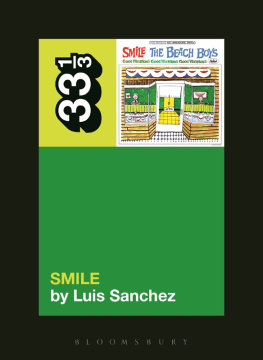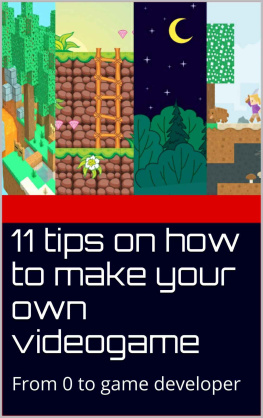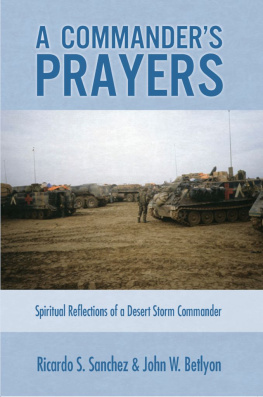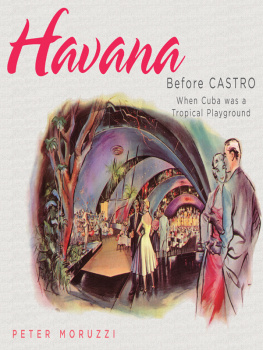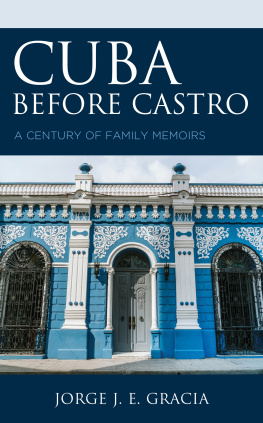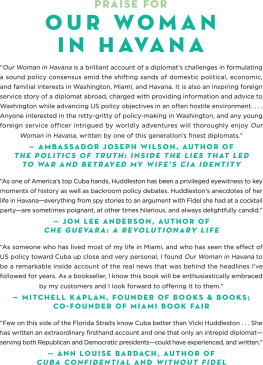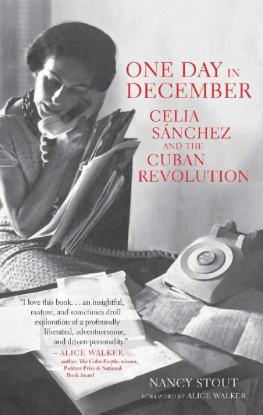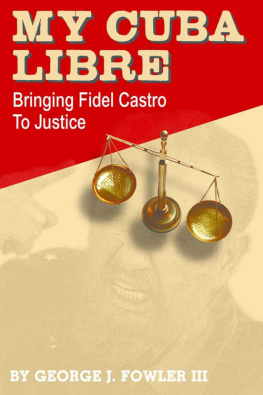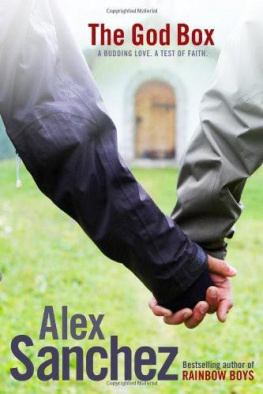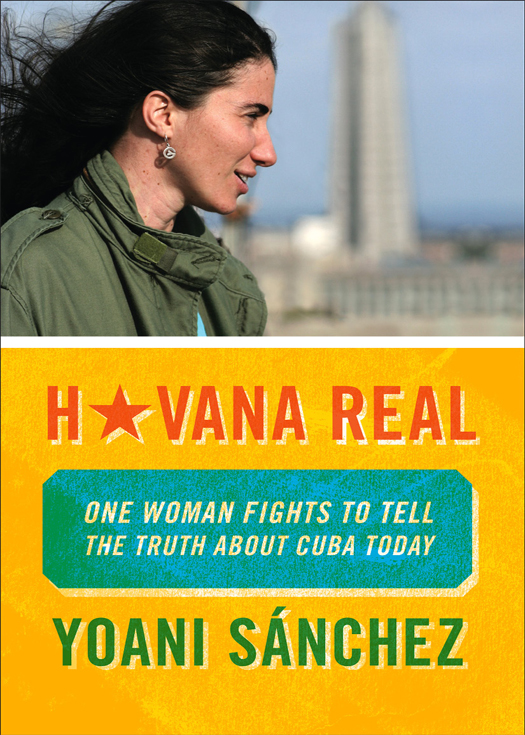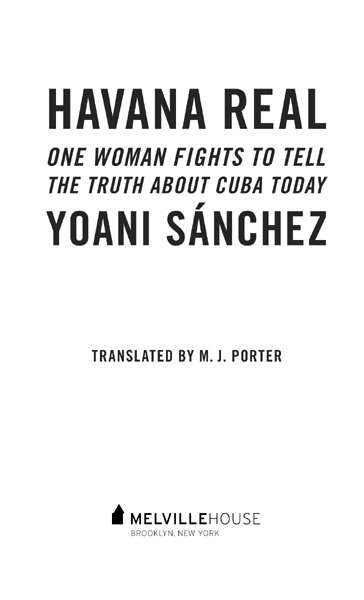YOANI SNCHEZ , a University of Havana graduate in philology, emigrated to Switzerland in 2002. Two years later, she decided to return to Cuba, but promised herself she would live there as a free person and started her blog, Generation Y, upon her return. In 2008, Time Magazine named her one of the 100 Most Influential People in the World; it named Generation Y one of the Best Blogs of 2009. Spain honored her with its highest award for digital journalism, the Ortega y Gasset Prize. She has also been named one of the 100 Most Notable Hispanic Americans by El Pais (Spain). In 2010 she received the World Press Freedom Hero award from the International Press Institute, and was named a Young Global Leader by the World Economic Forum.
In 2009 she became the firstand so far onlyblogger to interview President Barack Obama, who commented that her blog provides the world a unique window into the realities of daily life in Cuba, and applauded her efforts to empower fellow Cubans to express themselves through the use of technology.
She lives with her husband, independent journalist Reinaldo Escobar and their son Teo in a high-rise apartment in Havana, overlooking Revolution Square.
Her blog is online in English at desdecuba.com/generationy
Translator M.J. PORTER lives in Seattle, where she is a partner in a transportation-consulting firm. She co-founded a cooperative translation site, HemosOido.com, where volunteers now translate the work of more than thirty Cuban bloggers into English, German, French, Italian, and Portuguese.
Havana Real
Originally published in Italian, in an earlier form,
as Cuba Libre: Vivere E Scrivere Allavana
2009 RCS Libri SpA - Milano
Translation from Spanish 2011 M.J. Porter
Fidel Castro, present and past, originally published
in the Washington Post, August 5, 2010
Melville House Publishing
145 Plymouth Street
Brooklyn, NY 11201
www.mhpbooks.com
The Library of Congress has cataloged the paperback edition as follows:
Snchez, Yoani, 1975
[Cuba libre. English]
Havana real : one woman fights to tell the truth about Cuba today / Yoani Sanchez ; [translated by] M.J. Porter.
p. cm.
eISBN: 978-1-935554-91-2
1. Snchez, Yoani, 1975Blogs. 2. CubaSocial conditions21st century. 3. CubaHistory1990- 4. Women journalistsCubaBiography. I. Title.
F1760.S2813 2011
972.9107dc22
2011005142
v3.1
CONTENTS
INTRODUCTION
BY M.J. PORTER

INTRODUCTION
In 2004, Yoani Snchez returned to Cuba two years after emigrating to Switzerland, where she and her family had planned to start a new life in a free and democratic country. Explaining a condition of her return, she said:
I promised myself that I would live in Cuba as a free person, and accept the consequences.
This book is one of those consequences.
Yoani was born in 1975 in a tenement in Central Havana to parents who were just a few years older than the Revolution. She inherited her love of books from her father (an engineer on the national railway), worked hard at school, and proudly put the Little Pioneer scarf around her neck, vowing to Be like Che!
She was fourteen when the Berlin Wall fell and the Soviet Union cut most of its $6 billion annual subsidy to Cuba. Fidel Castro warned the nation that it was facing a special period in a time of peace. Yoanis adolescence was marked by this Special Period, a time of terrible scarcitywhen a word, alumbrn, was coined for the unusual situation of electricity being on; when fried grapefruit rinds took the place of meat in the national diet; when, it was rumored, melted condoms sometimes stood in for the cheese on a concoction that was anything but pizza.
Yoani finished high school during the Special Period and was accepted to the University of Havana. She had dreams of becoming a journalist but instead found herself channeled into philologythe study of words. At 17, she met her future husband, Reinaldo Escobar, a fired-journalist-turned-elevator-mechanic, and when she was 19 their son, Teo, was born.
Though she continued to study after Teos birth and went on to receive her degree, she did not pursue a career in academia. Her incendiary thesis, Words Under Pressure: A Study of the Literature of the Dictatorship in Latin America, assured that her scholarly interests would not be welcomed. She has no regrets.
Working as a freelance Spanish teacher and as a guide for German tourists allowed Yoani to help support her family, but it couldnt compensate for the disenchantment and economic suffocation of daily life under the Castro dictatorship. When she left for Switzerland in 2002, she was traveling a well-worn path, one taken by tens of thousands of Cubans every year. Her decision to return was far less common.
Before leaving for Switzerland, Yoani had already built her first computer out of spare parts. When she returned home, she, Reinaldo, and a few friends started the online magazine Consensus, with Yoani in the role of designer and webmaster.
In April 2007, combining her love of language with computing skills that she had further honed in Switzerland, she launched her own blog, Generacin Ythe Y referring to the popularity of that letter in her generations first names. To post her entries she had to dress as a tourist and pretend to speak only German so she could sneak into hotel Internet cafs, at a time when burly bouncers enforced the law barring Cubans from tourist hotels.
The blog was a work in progress, and it wasnt until December of 2007 that she was able, for the first time, to provide her readers with the chance to comment. As she described it:
In the moment of that first reader comment, I felt my blog come alive. Become its own being. Wherever I am, whatever Im doing, even as I sleep, people are visiting Generation Y, talking to me, to each other, telling their own stories yes, thats exactly what its like no, no its not, youre crazy stop, wait a minute no, no, listen listen oye.
The reach and power of Yoanis blog soon grew. In early 2008, she was awarded Spains most prestigious journalism prize, and Time magazine named her one of the 100 Most Influential People in the World. A few weeks later, the Cuban regimes cyber response brigade was finally able to block access to her blog throughout Cuba, and suddenly Yoani herself could no longer see her site. A team of helpersled by a Cuban exile in Canada who had studied journalism with Reinaldo at the University of Havanapicked up the reins. From that point on, Yoani had to rely on the help of friends and strangers, e-mailing her entries for others to post.
When Gorki Aguila, the leader of the punk rock band Porno Para Ricardo, was arrested on a Monday in August of 2008 and charged with pre-criminal dangerousness, Yoani and friendsin Cuba and abroaddrew on the growing influence of her blog and the power of the Internet. By Wednesday, the scheduled day for Aguilas trial, his plight was already in headlines around the world. The regime delayed the trial to let it all blow over, but on Friday, the international news media gathered outside the courtroom with their cameras and commentators. Later that evening Aguila walked free, with an almost certain four-year prison sentence reduced to a $25 fine.



